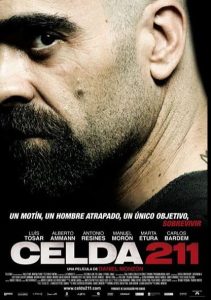
Cell 211 is a film of extraordinary gravity that blasts through the expected prison film clichés and into something else entirely. It moves briskly, develops characters with precision and efficiency, and drags you with all speed into a finale that gleefully courts disaster. This film comfortably inhabits a place where a lonely human being plunged into impossible circumstances is free to find his own way, even if his cause is truly lost. This is not one of those narratives crafted from a position of safety, where the protagonist is veiled in a rarefied light and all the right people pull through while inconvenient aspects of a complicated situation never enter into the story. The story of Cell 211 progresses in as sloppy a fashion as imaginable, just as a prison riot should. The setup is simple: a prison guard is to start at a high security facility the following day and is taking a tour; he is knocked unconscious by a bit of plaster from the ceiling and a riot breaks out during the confusion, and he is abandoned by the other guards who run for their lives as the inmates overwhelm the block. And so Juan Oliver must think fast, pass for a prisoner, and survive the day.
A lesser film would have a protagonist who is too clever by half and capable of busting heads with unexplained martial art prowess. But this is no simple action flick – the guy is just a guy, not terribly smart or strong, but he has that survival instinct, and the insane courage that comes from having no other choice but to go straight through the gauntlet. He joins the inmates as the riot is in full swing, knowing that the slightest mistake will end with his gutted body. The riot’s leaders are from the DSS program, prisoners marked for special surveillance, prisoners who spend nearly their entire time behind bars in solitary, tenderized by frequent beatings. This riot, as with all others, is to negotiate for better conditions. The government will pretend to give a shit, then ignore the demands as they always have. This time, however, the prisoners have four hostages who the government does care about – terrorists from the Basque separatist group ETA. They do not wish to make waves by allowing these men to be harmed, and so the SWAT teams are at the ready to keep them alive at all costs. Juan Oliver, on the other hand, is a civilian, and can go fuck himself. It gets worse, but I think you get the gist – this is no ordinary prison film, and it gets complicated fast. The rioting prisoners are under the command of Malamadre, a Ruthless motherfucker if ever there was one, while the police cannot even contain protesters or family members of prisoners outside the prison.
The acting is solid throughout, and the characters are finely shaded even when larger than life. Juan has a cruel arc to take, and he conveys this with a the unpolished presence of an everyman. Malamadre lives up to his name. The rest of the crew are fucking perfect, right down to the violent prison chief who portrays the 80s action icons like the whiny little entitled bitches that they are – more on this in a moment. Above them all, the director projects a moody gloom over the proceedings, making a living and breathing character of the crumbling prison, emblematic of the justice system. Its beating heart is Cell 211 itself. The first prisoner onscreen carefully crafts a razor out of a cigarette filter, slashing his wrists for reasons that become clearer with time; the prison itself is a disease, and it eats away at every person within; and so it metastasizes to the rest of the population.
Prison films, due to their inherently limited settings, must adhere to certain tropes, and Cell 211 checks a few familiar boxes, but it also goes for the vitals of an action film mainstay – namely, the conservative sacred cow of delicious revenge. This brings us back to the skull-cracking prison warden, who believes in spilling blood to make a point. Justice is often portrayed as a matter of personal revenge, since an impartial and faceless system could never provide an equal hand. To put it more bluntly, the government is infiltrated by liberal faggots, all of whom are just itching to free violent criminals for any technicality so as to allow mass rape and murder of innocent bystanders with no lines of dialogue. Any thinking person understands that lone gunmen dispensing justice makes for great entertainment but poor public policy. Still, a large number of people worldwide actually believe in justice via an iron fist. The prison warden is quick to action, but only makes the situation worse. A basic flaw to our favorite 80s action icons is that they are all correct without fail; in reality situations like this explode in ways that cannot be anticipated, hence the advantages of a dispassionate system that is fair even when such a thing is distasteful. Cell 211, takes takes a long, hot piss on the entire idea of worship of authority figures.
This is not a political screed, however. Cell 211 is pure entertainment, and exploits the emotions of the audience by the oldest method available – characters that are well-developed and relatable. There is a point to the story, and clearly Daniel Monzon has an axe to grind against the criminal justice system of Spain, but this is to the benefit of a fine story. If this were entirely fictional, it would be rather easy to forget once catharsis has been achieved. There is no true end to Cell 211, and what happens here will continue until justice systems live up to their billing and dispense with revenge.
Cell 211 screened at the Wisconsin Film Festival.